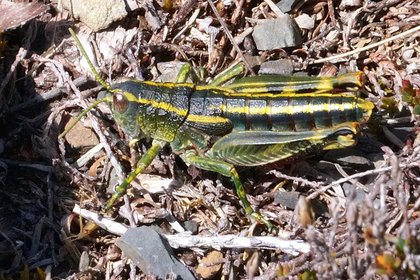
An alpine green rock-hopper grasshopper (Brachaspis collinus) at Rainbow ski area, Nelson Lakes. Image credit: Professor Steven Trewick.
New research indicates anthropogenic climate change will result in a quarter of Aotearoa New Zealand’s alpine grasshopper species becoming extinct. Species that are already endangered and others that are currently widespread could lose all of their current habitat due to global warming.
The research paper, recently published in Royal Society Open Science journal, suggests devastating impacts on all 12 alpine grasshoppers in New Zealand.
The paper, co-authored by Massey University PhD graduate Dr Emily Koot, Professor Mary Morgan-Richards and Professor Steven Trewick from the School of Natural Sciences, infers the future distribution of the species by projecting current niche models onto the predicted New Zealand climate, with one or 3.7 degrees Celsius warming.
“The conclusion was that most of these alpine species that occur nowhere else on the planet, would lose at least 30 per cent of suitable habitat. Even with just one degree warming, both the green rock-hopper [Brachaspis collinus] and the endangered Alexandra grasshopper [Sigus childi] would have nowhere to live.”
Professor Trewick says temperatures on Earth have risen by 0.66 degrees Celsius in the past twenty years. “The one degree threshold will soon be passed, when we can expect the green rock-hopper will be extinct and our other widespread flightless grasshopper species will have reduced and fragmented habitat. Our model projections show that the only habitat available for the endangered Alexandra grasshopper will be outside of its current range, so will require human transportation if it is to be saved.
“Most of our alpine animals have populations that are restricted to high-elevation ‘islands’ and cannot jump or fly the gap to unconnected mountain habitat. This means that as the Earth warms alpine species will find their habitat dwindling. In Aotearoa New Zealand, most of our alpine plants and animals are found nowhere else in the world. When their habitat shrinks, we are set to lose a quarter of all our endemic alpine biodiversity,” Professor Trewick says.